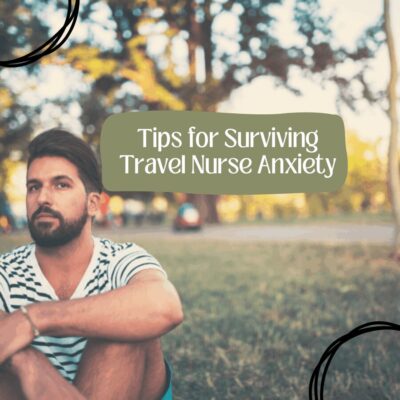We love our furry family members! We can’t say enough about the benefits of travel nursing with your dog. It’s also essential to communicate with your recruiter about your desire so you can find pet-friendly housing and a dog walker when you’re on a long shift. Taking Fido with you is exciting, strengthens your bond, increases physical activity with outdoor adventures, reduces separation anxiety, and encourages social interaction for your pet and yourself. It can be the adventure of a lifetime for both of you.
Travel Nursing with Your Dog:

Benefits of Traveling with Your Dog
Moving to a new place can be stressful, so having a familiar furry face by your side can ease the stress and loneliness during travel assignments. Petting your dog lowers blood pressure, eases your mind, and fights anxiety you may have about moving to a new place. We always recommend having personal essentials with you like music, photos, and favorite clothing items, but it’s also comforting to be traveling with your dog.
And it’s good for both of you to be together!
Getting out in nature for a walk or hike allows Fido to explore their new home; we call it a “sniff-ari,” a sniffing safari. Just 20 minutes of sniffing is equal to a one-hour walk, so it’s healthy to let your dog get used to their new neighborhood. Walking in the sunshine is also healthy for humans in terms of getting much-needed Vitamin D as well as clearing your mind.
Another benefit of travel nursing with your dog is that you and your pet can meet new people. Check out the local dog parks and say hello to neighbors you see while walking. Visit municipal parks and learn more about your new home. Visit Bring Fido to find out where the dogs are meeting and where there are pet-friendly accommodations.
It’s also security to have your dog with you. Our providers tell us there is a sense of peace in having the familiar bark of their dog to notify them of people near their home or to have with them as they take a long drive.

Essential Considerations
As always, we recommend communicating with your recruiter about your intention to travel with your dog. Every assignment is different, and they need to know things upfront so they can plan accordingly. There may be limited housing options where you cannot take your pet; these can be easily eliminated if your recruiter knows you’re traveling with Fido.
Finding pet-friendly housing is essential. Even if you’re working in a big city with many options, remember that you and your dog will need dog-friendly spaces like parks and grassy areas. Learn about local pet laws, such as picking up after your dog and noise ordinances. If you’re renting directly from a landlord, be sure to ask about pets, pet deposits, and pet rent so no one is surprised when you show up with your dog.
When you’re preparing your resume, certifications, and referrals, don’t forget to pack your pet’s documentation. This includes a travel certificate that verifies the health of the dog as well as their vaccination record. If microchipped, don’t forget to change your address.
Preparing for Travel Nursing with Your Dog
It is essential to keep your dog as close to their routine as possible. If you wake up, have coffee, and walk, keep the same routine even while on the road. It will alleviate stress for both of you. Dogs love a routine, so keep it when you arrive at your destination, too.
In the car, take essential pet supplies like crates, seat covers, or hammocks. For long drives, it may be good to use a hammock rather than a crate so your dog can move around more. The seat cover will help keep your car clean and your dog safe. Water, food, treats, and collapsible dog bowls will make it easy for your dog to stop, stretch, and hydrate. Some dogs are too stressed to eat their meals while on the road because they don’t like change, but snacks might work. They’re good as long as they’re drinking water and going to the bathroom
Plan ahead so you’re not stopping in remote areas. We want you and your dog to arrive safely. Try to plan your stops or stop in areas where there are people like restaurants or rest stops.
When you arrive, maintain their routine with consistent feeding and exercise. You may consider hiring a dog walker from Rover or Wag or nearby doggy daycare, especially when you work long shifts. This will help your dog stay on their routine, and you won’t have an excited dog or accidents in the house. Find a veterinarian near you just in case your pup needs attention or vaccinations.
Lastly, find the dog people at work! It’s a great way to network, make friends, and find dog-friendly places to visit.
We’re excited you’re travel nursing with your dog and wish you both all the best on your new adventure!
We hope you found this article on tips for travel nursing with your dog helpful. Have you ever traveled with your dog? Share your tips for travel nursing with your dog below.
Find Your Next Travel Healthcare Assignment with Our Job Board!
Are you on the hunt for your next travel healthcare gig? Look no further than our job board! Click here to explore all our current opportunities. We have opportunities for all travel healthcare professionals.
Discover the Perfect Housing for Your Next Assignment
Need somewhere to stay on your next travel healthcare assignment? We’ve got you covered. Check out our housing page to find your ideal home away from home. Click here to start your search.



























 )
)


























